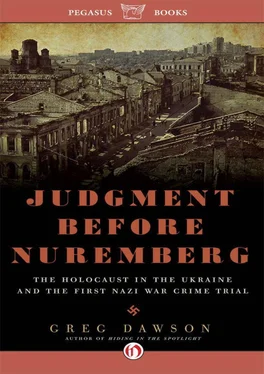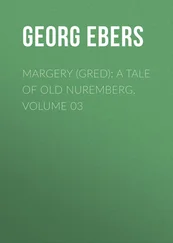Greg Dawson
JUDGMENT BEFORE NUREMBERG
THE HOLOCAUST IN THE UKRAINE AND THE FIRST NAZI WAR CRIMES TRIAL
This is not a book I ever expected to write. I ended up writing it because no one else has, and because a book like mine is overdue—by several decades. It’s a byproduct of Hiding in the Spotlight, my account of my Ukrainian mother’s escape from the Holocaust, published in 2009, but it’s not exactly a sequel.
In the course of making public appearances for Hiding in the Spotlight, now close to 150, I was startled to find that most people in these interested audiences knew virtually nothing about the Holocaust in Ukraine—as little as I had before doing research for my mother’s memoir.
Like me, they were not aware that what we think of as the Holocaust—the mass extermination of Jews by the Nazis—did not begin in Germany or Poland, but in Ukraine after Hitler invaded the Soviet Union in June 1941. Nor did they know that at least 750,000 Jews—mostly Ukrainian—were murdered by gunfire before the gas chambers at Auschwitz-Birkenau began operation, the majority even before the tenets of the Final Solution had been formally laid down by Hitler and Himmler.
While I had encountered a few people here and there during my travels who knew about those events, I have yet to find a single person out of the many hundreds I have addressed, from university professors to families of survivors, who could answer this question correctly: When and where was the first trial of Nazis for their crimes during the war?
Nuremberg, Germany, in 1945 is a good guess. But it is wrong. The correct answer is Kharkov, Ukraine, December 1943.
I happened on this startling fact at the Holocaust museum in Kharkov in 2006 while doing research for Hiding in the Spotlight. I mentioned it in the epilogue of that book and did not expect to return to it—until my book-tour experience revealed a gaping black hole in public knowledge of the Holocaust that cried out to be filled.
I said a book “like mine” is overdue because although there are many books about the Holocaust in Ukraine on library shelves, few even touch on the Kharkov trial. Nearly all were written by historians and scholars and, sadly, it seems that nearly all of them have been read only by other historians and scholars, not general readers, resulting in this rather disturbing gap in popular understanding of the Holocaust.
I am neither historian nor scholar. I am a newspaper reporter of more than four decades, accustomed to writing stories that assume the reader may not know anything about my subject, be it a basketball game, oil spill, or city zoning law. I am used to writing for the intellectually curious but under-informed, something that could be a byword when it comes to Ukrainian Holocaust scholarship.
Ukraine is the final frontier of Holocaust scholarship and literature. Since the dissolution of the Soviet Union in 1991, a mother lode of secret and suppressed material about the Holocaust in Ukraine has been made available to academics and journalists, and the flow continues nearly two decades later. In early 2011 the archives of the Ukrainian KGB agreed to open its wartime files to the Yad Vashem Holocaust Memorial after more than fifty years of secrecy. All this promises to keep historians busy for decades doing the grueling work of real scholarship.
Judgment Before Nuremberg is the tip of the tip of the iceberg, a very personal journey through one small corner of history. If casual readers learn as much reading the book as I did writing it, I will have accomplished one of my goals—and the credit will belong to the master historians: Raul Hilberg, Christopher Browning, Richard Rhodes, Deborah Lipstadt, Yitzhak Arad, Alexander Prusin, and many others, without whose work this book could not have been written.
And if Judgment Before Nuremberg moves readers to seek out those sources of my own illumination and inspiration, and to discover the full breadth of their majestic work, I will have accomplished both my goals.
Even under many layers of warmth including a bulky new coat—a final-hour gift from my mother—my blood ran cold on a December night in Ukraine as I boarded a shuttle bus at Borispol International Airport in Kiev. It was the second time that night that the shuttle had made the trip from the terminal to an Aerosvit Airlines commuter jet on the tarmac for the flight east to Kharkov near the Russian border, the final leg of my journey which had begun 15 hours earlier in Orlando, Fla.
On the first attempt, the plane had reached Kharkov but could not land due to icy runways, and returned to Borispol. The shuttle took us back to Terminal A, the departure point for regional flights. It was late Friday night and the terminal was teeming with passengers on the way to Odessa, Lviv, Donetsk, and other weekend destinations. Maybe the plane would try again in a few hours. Maybe not.
For those accustomed to spacious, mall-like American airports, “terminal” belies the reality of Terminal A at Borispol, which is closer to a bus station in size and amenities. There was a kiosk offering hot drinks, hard liquor, and snacks, but no TV screens tuned to CNN, no gift shops to browse or newsstands selling English-language newspapers. There was little for me to do but people-watch, and for a long while I was diverted by the antics of a pixyish girl about eight years old who raced and pirouetted across the waiting room, mugging for an invisible camera.
By the time we left Kiev several hours later, I understood the significance—the meaning for me—of this little Ukrainian dervish.
This was my second trip to Ukraine. I had come in 2006 to do research for Hiding in the Spotlight , a book about my mother, Zhanna Arshanskaya Dawson. She and her younger sister, Frina, are the only known survivors of a Nazi death march in January 1942 that led 16,000 Jews, including Frina and Zhanna’s parents and paternal grandparents, to Drobitsky Yar (Russian for “ravine”), a killing field outside Kharkov. It was thought that no one could have possibly escaped the march, so when a memorial was erected with the names of victims etched on walls, the sisters’ names appeared next to those of their parents and grandparents.
Brushing my fingertips across the Cyrillic letters spelling out my mother’s name was a jolting brush with my own mortality—a reminder that the Nazis meant for half my genes to have been interred in that deep ravine with her bones. SS chief Heinrich Himmler made that clear in describing the steps necessary to ensure the extermination of the Jewish race.
“We have come to the question: how is it with the women and children?” he told an assembly of SS officers. “I have resolved on a completely clear solution. I do not consider myself justified in eradicating the men and allowing the avengers in the shape of the children to grow up for our sons and grandsons. The difficult decision had to be taken to cause this Volk to disappear from the Earth.”
Why had I decided to return, to reappear in Ukraine? Not to taunt Himmler’s ghost with my presence and thereby avenge the murder of my grandparents and great-grandparents. There is no commensurate vengeance for these crimes. I had come back to do what I could to end the coverup of this crime, the darkness surrounding Drobitsky Yar and Ukraine’s Jews. It’s been said that history is written by the winners, but in the history of the Holocaust it’s as though the chapter on Ukraine had been written by Himmler himself. For all practical purposes, the pages are blank.
Читать дальше












